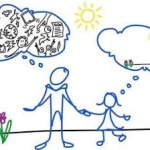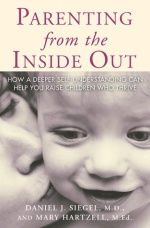|
Quote of the Week
"The best way to teach your children is to be what you want them to be.'' - Mahatma Gandhi

Mindful Parenting--How To Respond Instead Of React

What does your stress look like? Our bodies and brains are wired to react to high stress situations as a safety net. If our brain perceives a threat, it signals the amygdala, the body’s “alarm” system, which tells our body to act without thinking. The amygdala responds to situations with the fight, flight, or freeze response. This is to protect us, but our stress receptors cannot distinguish between real dangers or false dangers.
In everyday parenting, our stress response often gets triggered unnecessarily by events that are not actually life threatening. Our bodies are reacting to our kid spilling cereal all over the floor in the same way we would react if we were being chased by a bear. Depending on your childhood experiences and memories, your stress response may be triggered more easily than another person. When our stress receptors are triggered, we have difficulty thinking clearly and being attentive to people around us. We are unable to be thoughtful in our responses, and have trouble staying focused, and our ability to solve problems is diminished.
Dr. Dan Siegel, a clinical psychologist who studies the brain, explains that during stressful parenting moments we may “lose control” or “flip our lid” and let our emotions control our reactions. When we “fly off the handle,” it happens so quickly and we aren’t thinking about how our children are perceiving us. Our reactions can be very scary to kids. Also, we are modeling that this is how grown ups react to stress. If we choose to be more mindful by pausing before responding, we can teach kids that they, too, can pause and choose to respond instead of react. Read more about the benefits of mindful parenting in this week's featured article.

Reading Corner
 Title: Parenting From The Inside Out: How A Deeper Self-Understanding Can Help You Raise Children Who Thrive By: Daniel J. Siegel and Mary Hartzell Title: Parenting From The Inside Out: How A Deeper Self-Understanding Can Help You Raise Children Who Thrive By: Daniel J. Siegel and Mary Hartzell
Ages: Adult
"Child psychiatrist Daniel J. Siegel, M.D., and early childhood expert Mary Hartzell, M.Ed., explore the extent to which our childhood experiences shape the way we parent. Drawing on stunning new findings in neurobiology and attachment research, they explain how interpersonal relationships directly impact the development of the brain, and offer parents a step-by-step approach to forming a deeper understanding of their own life stories, which will help them raise compassionate and resilient children."
--Publishers
Recommended by Kindful Kids Editors

Be The Change
Try out any of these suggested tips on mindful parenting this week. Which ones were easy to do? Which were more challenging? How did your interactions change with your kids?

Kindful Kids newsletter is a resource for parents who are keen to teach children about compassion and service. It reaches 3,919 subscribers. You can unsubscribe here.
|